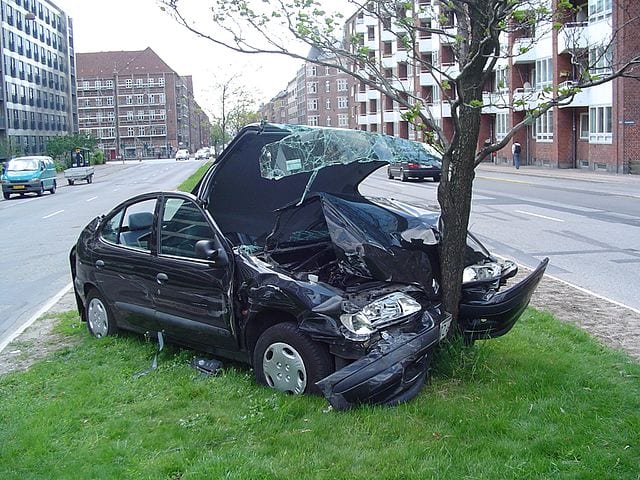
This is a portion of a 2002 article that was included (with additional Augustine and Aquinas quotations) in my book, Christian Worldview vs. Postmodernism (see the entire article). It deals with the problem of evil, which I, and I think, most Christian apologists and philosophers of religion, regard as the most serious objection to Christianity and God’s existence.
*****
Critics object that the free will defense (FWD) doesn’t address natural evils (things such as disease, earthquakes, famine, falling off a mountain, etc.), thus it is insufficient, and fails. This isn’t true at all. FWD doesn’t have to address natural evils because these are a necessary consequence of natural laws themselves. For example:
1. Rocks are hard.
2. Gravity exists.
3. Human faces, after a significant fall due to gravity, do not mix very well with rocks (assuming they happen to sit at the bottom of the fall).
4. The “natural evil” of a crushed skull or broken nose and severe scrapes may, therefore, occur.
Logical conclusion(s):
A. #1-3 are all natural laws (physics, chemistry, and biochemistry).
B. Natural laws are such (by their very nature, and given physical objects) that “injuries” and “annihilations” will inevitably occur.
C. Therefore, “natural evil” (insofar as the term makes any sense at all – it simply reduces to “unfortunate natural events”) is a necessary result of natural laws.
D. Therefore, to eliminate so-called “natural evil” is tantamount to the elimination of natural laws of matter, energy, etc. themselves.
E. Ergo: since elimination of natural laws would produce a chaotic, utterly unpredictable and formless world, this cannot be a possibility in the natural world as we know it; therefore the entire objection to this “absence” in FWD fails utterly.
Natural disasters are a necessary result of natural laws as we currently know them, and this is the real world, not one of the fantasy worlds atheists sometimes invent in order to maintain their rejection of theism, on these grounds. God could have changed these laws and made them operate some other way. But He didn’t.
We don’t have all the answers as to why He did what he did. He also could have made a world where atheists would see the clear evidence for His existence, and never resist it. But He didn’t. That’s because He values human choice and free will more than even obedience to Himself, even when He knows that being children of God is the best and most fulfilling choice for human beings. He doesn’t want coerced slaves; He wants children. And, for our part, we would much rather be sons and daughters of a loving Father than slaves of a wicked Master.
Unfortunately, natural laws as we know them involve decay and death. Everyone dies; we all get a “disease” in that sense. To have no disease and illness would mean being immortal and never having to age, decay or die. But cells, unfortunately, degenerate. Galaxies, stars, and universes all eventually “die.” So does biological life (much more quickly). That’s just how it is. The universe is winding down, and so is every one of us.
It is said that God could and should have performed many more miracles than Christians say He performs, to alleviate “unnecessary” suffering. But this is precisely what a natural world with laws and a uniformitarian principle precludes from the outset. How is it that the atheist can (in their hypothetical theories and arguments against Christianity) imagine all sorts of miracles and supernatural events that God should have done when it comes to evil and the FWD? “God should do this,” “He should have done that,” “I could have done much better than God did,” . . .
Yet when it comes to natural science (which is precisely what we are talking about, in terms of ”natural evil”), all of a sudden none of this is plausible (barely even possible) at all. Why is that? Legions of materialistic, naturalistic, and/or atheist scientists and their intellectual followers won’t allow the slightest miracle or direct divine intervention (not even in terms of intelligent design within the evolutionary hypothesis) with regard to the origin of life or DNA or mammals, or the human brain or eye, or even unique psychological/mental traits which humans possess.
Why would this be? I submit that it is because they have an extreme reluctance to introduce the miraculous when the natural can conceivably explain anything. They will resist any supernatural intervention into biological processes till their dying breath.
Yet when we switch the conversation over to FWD all of a sudden atheists — almost in spite of themselves – are introducing “superior” supernatural options for God to exercise, right and left. God is supposed to eliminate all disease, even though they are inevitable (even “normative”) according to the laws of biology as we know them. God is supposed to transform the entire structure of the laws of physics, so no one will ever get a scratch on their face. He is supposed to suspend a bullet in mid-air so it won’t kill its intended target, or make a knife turn to liquid before it rips into the flesh of yet another murder victim.
In the world these atheist critics demand of God, if He is to be a “good” God, or to exist at all, according to their exalted criteria, no one should ever have to get a corn on their toe, or a pimple, or have to blow their nose, or have chapped lips. God should turn rocks into Jello every time a child is to fall on one. Cars should turn into silly putty or steam or cellophane when they are about to crash. The sexually promiscuous should have their sexual diseases immediately healed so that no one else will catch them, and so that they can go on their merry way, etc.
Clearly, these sorts of critics find “plausible” whatever opposes against theism and Christianity, no matter what the subject is; no matter how contradictory and far-fetched such arguments are, compared to their attacks against other portions of the Christian apologetic or theistic philosophical defenses. Otherwise, they would argue consistently and accept the natural world as it is, rather than adopting a desperate, glaring logical double standard.
In effect, then, if we follow their reasoning, the entire universe becomes an Alice in Wonderland fantasy-land where man is at the center. This is the Anthropic Principle! Atheists then in effect demand from God the very things they claim to loathe when they are arguing against theism on other grounds. Man must be at the center of the universe and suffer no harm, in order for theism to be true. Miracles must take place here, there, and everywhere, if theism is to be accepted as a plausible or superior alternative to atheism.
The same atheists will argue till they’re blue in the face against demonstrable miracles such as Jesus’ Resurrection. What they demand in order to accept Christianity they are never willing to accept when in fact it occurs to any degree (say, e.g., the healings performed by Jesus). God is not bound by human whims and fancies and demands. The proofs and evidences He has already provided are summarily rejected by atheists, one-by-one, as never “good enough.”
Atheists and other skeptics seem to want to go to any lengths of intellectual inconsistency and hostility in order to preserve their skepticism. They refuse to bow down to God unless He creates an entirely different world, in order to conform to their ultimately illogical imaginings and excessive, absurd requests for what He should have done. They’re consistent in their inconsistency.
By definition, the natural world entails suffering. One doesn’t eliminate that “difficulty” simply by resorting to a hypothetical fantasy-world where God eliminates every suffering by recourse to miracle and suspension of the natural laws He put into place.
In any event, the world as He created it did not originally involve suffering (nor will it in the future, for the redeemed). Man could have chosen to live in such a world, just as the unfallen angels did. They chose never to rebel. But man did, and having done so, now he wants to blame God for everything for which the blame in actuality lies squarely upon his own shoulders.
The natural world can’t modify itself every time someone stubs their toe or gets a sunburn. That would require infinitely more miracles than any Christian claims have occurred. With a natural world and natural laws, any number of diseases are bound to occur. One could stay out in the cold too long and get pneumonia. Oh, so atheists want God – if He exists – to immediately cure every disease that comes about?
Again, the miraculous, by definition, is not the normative. It is the extraordinary, rare event. I might stay underwater too long, swallow water, and damage my lungs. I could fall while ice skating, bump my head severely and damage my brain. I might eat a poisonous mushroom, or get stung by a poisonous snake, etc., etc. That’s how the world works. It is not God’s fault’ it is the nature of things, and the things of nature.
In an orderly, uniformitarian, largely predictable natural world which makes any sense at all, there will be diseases, torn ligaments, colds, and so forth. The question then becomes: “how much is too much suffering?” or “how many miracles is God required to perform to be a good and just God?” At that point the atheist can, of course, give no substantive, non-arbitrary answer, and his outlook is reduced to wishful thinking and pipe dreams.
Materialistic evolutionists resist miraculous creation at all costs precisely because they think miracles are exceedingly rare. Christians apply the same outlook to reality-at-large. We say that miracles will be very infrequent, by their very nature (“SUPERnatural”). And that must be the case so that the world is orderly and predictable enough to comfortably live in, in the first place.
The many atheists with whom I discussed this subject (I was on a list with some 40-60 atheists or agnostics) didn’t really deal at all with the difficulties inherent in making a world where there is not even any “natural evil.” All they did was imagine a world in which there was no suffering (which is easy enough for anyone to do, but extremely simplistic and not exactly a rigorously philosophical approach).
They did not ponder all the logical – even physical – conundrums such a world would entail. A small child could opine that the world ought not to have any suffering whatever. But an adult has the responsibility to properly think through all the ramifications of that. He no longer has the luxury of the child, to create fairy-tales at his whim and fancy, about reality.
***
Photo credit: Thue (5-24-05). A car crash on Jagtvej, a road in Copenhagen, Denmark. [public domain / Wikimedia Commons]
***












